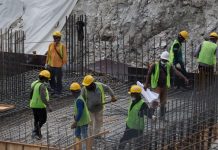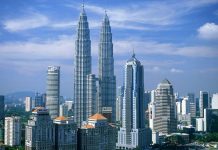
Global inflation is expected to reach 4 percent in 2022, the highest rate since 2008, as the Russia-Ukraine conflict adds a “further powerful impulse” to inflationary pressures, said the Monetary Authority of Singapore (MAS).
However, global inflation should ease to 2.2 percent in 2023 as supply challenges are addressed and major central banks around the world ease back on their Covid-19 fiscal support measures, said the central bank in its bi-annual macroeconomic review.
MAS maintained its forecast that core inflation in Singapore will remain “significantly above” its historical levels, coming in between 2.5 and 3.5 percent for the year.
Globally, the pickup in inflation has coincided with the rebound in spending and production activity in many economies since mid-2021, as Covid-19 restrictions eased around the world.
The report said the uptick in inflation partly reflects how supply cannot respond to the sharp rebound in demand in a timely way due to production bottlenecks and other factors, for example.
Nevertheless, MAS warned that the tightening labour markets and rising core inflation in some economies “suggest a broader inflationary process is taking hold”, reported TODAY.
“The outbreak of the Russia-Ukraine conflict in February added a further powerful impulse to inflation via steep increases in a range of commodity prices, including energy and grains, reflecting both countries’ important roles in the world supply of these products,” said MAS.
MAS explained that the punitive sanctions imposed on Russia owing to its invasion of Ukraine had discouraged buyers from purchasing Russian oil. This created a negative supply shock to global oil prices.
“Supply shocks typically cause a surge in prices that fades quickly once alternative producers increase output,” said MAS. “However, this time, a resolution to the ongoing supply shock does not appear imminent.”
The Organization of the Petroleum Exporting Countries (Opec) has indicated it will only increase oil production modestly, while shale producers have little near-term capacity, with shale oil not a good substitute for Russian crude oil.
Thus, the central bank said that “considerable uncertainty” surrounds the global inflation outlook.
“The pandemic and the Russia-Ukraine conflict could impose further shocks on supply chains and prices, increasing the risk of a de-anchoring of inflation expectations,” said MAS.
Global growth is projected to ease to 3.9 percent in 2022 from 5.4 per cent in 2021 as elevated inflation meant more are tightening their belts, even as the world recovers from Covid-19.
For Singapore, MAS maintained its growth forecast at 3 to 5 percent this year, down from the 7.6 percent expansion in 2021.
Sustained inflation in Singapore
Because of strong pressures in the cost of imports arising from the Russia-Ukraine conflict and the tight labour market here, MAS maintained its forecast that core inflation in Singapore will remain between 2.5 and 3.5 percent for the year.
When labour market conditions are tight, it means that the economy is close to full employment, leading to upward pressure on wages.
“Slack in the domestic labour market has mostly been eliminated and is driving a rebound in resident wage growth,” said MAS.
“The confluence of a rise in energy, imported inputs and labour costs will lead to a build-up in business cost pressures.”
Consumer price pressures continued to intensify in the first quarter, with stronger inflation seen across all broad consumer price index categories.
“Higher oil and imported food prices at the turn of the year led to a pickup in electricity and gas and non-cooked food inflation, while accumulating business costs passed through to greater services price increases,” said MAS.
At the same time, MAS said the faster rate of increase in private transport and accommodation costs led to a larger rise in overall inflation.
Earlier this month, MAS had tightened its monetary policy in a rare two-pronged move in order to combat inflation.
Increase in domestic demand, travel
High inflation in Singapore may also “dent real incomes and could lead to a pullback in aggregate demand”, thus hampering economic growth, said the Republic’s central bank.
“These factors will continue to play out in the coming quarters, adding to significant uncertainty surrounding the ripple effects from the Russia-Ukraine conflict on Singapore’s economic growth,” said MAS.
However, the central bank added that the “additional drag on growth prospects from the conflict would be partially offset by a boost from the easing of domestic safe management measures and border restrictions from end-March”.
MAS noted that the loosening of travel restrictions in Singapore will bring forward the projected recovery in the domestic-oriented and travel-related sectors to the second quarter this year.
This is a faster pace of recovery for the embattled sector, compared with previous expectations for travel recovery to kick in from the second half of the year.
“The drivers of growth should broaden to the domestic-oriented and travel-related clusters over the course of this year, with the substantial easing of domestic safe management measures and border restrictions,” said MAS.
“The accommodation sector could take time to recover fully as tourists, particularly from countries in the region whose vaccination rates are lower, return only gradually, even as domestic demand for staycations wanes.”














